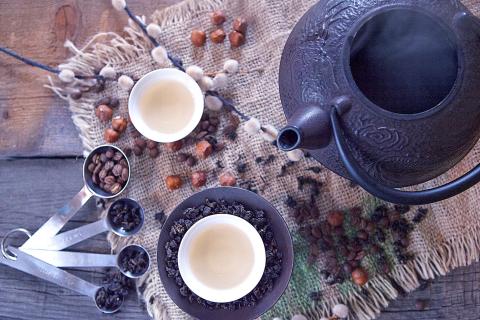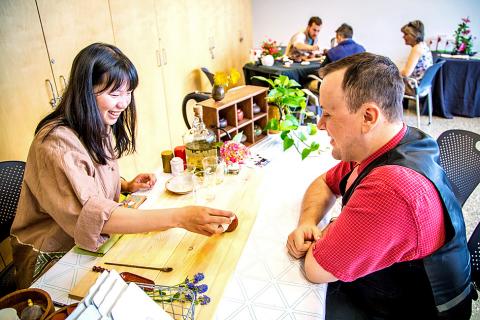Operating in the back of a small fabric shop in Vancouver, tea connoisseur Jenny Lo (羅靖茵) opens a bottle of cold oolong tea made from leaves sourced from Taiwanese farmers, whose tea would have never found a fair market overseas.
While visiting Taiwan, Lo remembers sitting around her grandfather’s large, heavyset tea table with collections of cups and kettles for steeping while he taught her about different aromas and how to tell the difference between tea varieties.
Inspired by her family’s four generation history in the Taiwanese tea business, Lo and her family launched Oollo Tea last year. The company sells hand-rolled tea leaves sourced from micro farms such as North Dongyan Mountain (北東眼山) in Nantou County and Pinglin District (坪林區) in New Taipei City.

Photo courtesy of Oollo Tea
Oollo Tea operates out of booths at festivals and special events around Vancouver. But instead of bringing teas to her customers this summer, Lo is collaborating with budding Taiwanese designers in a joint pop-up store starting next month in Vancouver’s West End.
Oollo Tea proudly promotes the direct trade model which gives farmers more pay than they would receive working with dealers.
According to Fairtrade Canada, 90 per cent of the tea market in North America is controlled by seven transnational corporations. Consequently, Lo says, farmers are “struggling through the system.”

Photo courtesy of Oollo Tea
“They’re really dedicated, but they’re so busy making good tea, they don’t have the energy to market themselves. So they’re kind of pressed to sell to big corporations … they’re not really being paid what I think it’s worth.”
Although Oollo Tea pays farmers higher prices, Lo stresses their self-regulating approach is different from the Fairtrade model which costs farmers additional money and paper work to get certified.
Tea hunter and Jenny’s father Tang Lo (羅賴堂) says they negotiate prices for each batch of tea based on the temperature, season and quality at harvest time.
Tang Lo also says the farmers are supportive of young entrepreneurs who create an international platform for Taiwanese tea.
“It’s enabling them to access outside Taiwan because most of them speak Mandarin and I am able to help them and be able to access the English-language market,” Jenny Lo added. For more information, visit oollotea.com

June 23 to June 29 After capturing the walled city of Hsinchu on June 22, 1895, the Japanese hoped to quickly push south and seize control of Taiwan’s entire west coast — but their advance was stalled for more than a month. Not only did local Hakka fighters continue to cause them headaches, resistance forces even attempted to retake the city three times. “We had planned to occupy Anping (Tainan) and Takao (Kaohsiung) as soon as possible, but ever since we took Hsinchu, nearby bandits proclaiming to be ‘righteous people’ (義民) have been destroying train tracks and electrical cables, and gathering in villages

Dr. Y. Tony Yang, Associate Dean of Health Policy and Population Science at George Washington University, argued last week in a piece for the Taipei Times about former president Ma Ying-jeou (馬英九) leading a student delegation to the People’s Republic of China (PRC) that, “The real question is not whether Ma’s visit helps or hurts Taiwan — it is why Taiwan lacks a sophisticated, multi-track approach to one of the most complex geopolitical relationships in the world” (“Ma’s Visit, DPP’s Blind Spot,” June 18, page 8). Yang contends that the Democratic Progressive Party (DPP) has a blind spot: “By treating any

Swooping low over the banks of a Nile River tributary, an aid flight run by retired American military officers released a stream of food-stuffed sacks over a town emptied by fighting in South Sudan, a country wracked by conflict. Last week’s air drop was the latest in a controversial development — private contracting firms led by former US intelligence officers and military veterans delivering aid to some of the world’s deadliest conflict zones, in operations organized with governments that are combatants in the conflicts. The moves are roiling the global aid community, which warns of a more militarized, politicized and profit-seeking trend

This year will go down in the history books. Taiwan faces enormous turmoil and uncertainty in the coming months. Which political parties are in a good position to handle big changes? All of the main parties are beset with challenges. Taking stock, this column examined the Taiwan People’s Party (TPP) (“Huang Kuo-chang’s choking the life out of the TPP,” May 28, page 12), the Democratic Progressive Party (DPP) (“Challenges amid choppy waters for the DPP,” June 14, page 12) and the Chinese Nationalist Party (KMT) (“KMT struggles to seize opportunities as ‘interesting times’ loom,” June 20, page 11). Times like these can